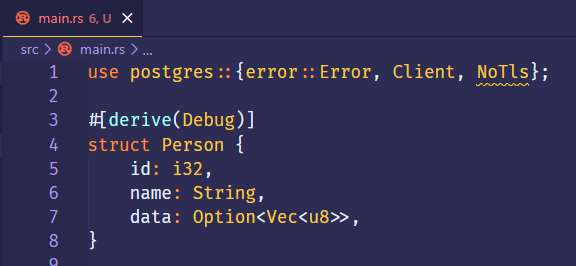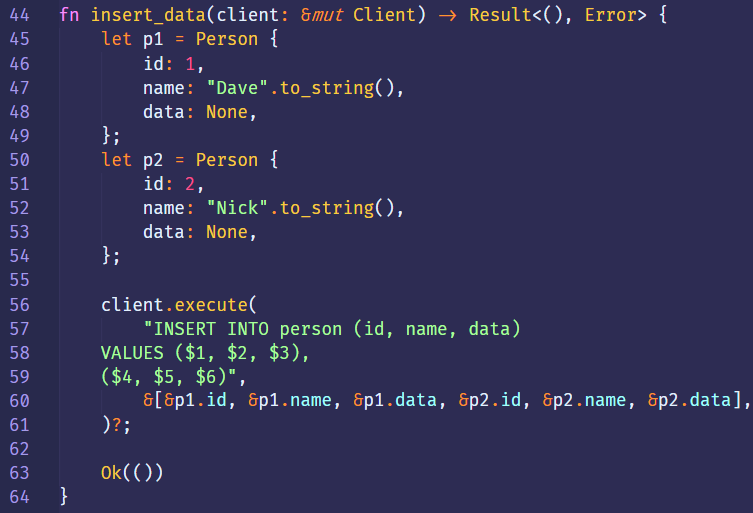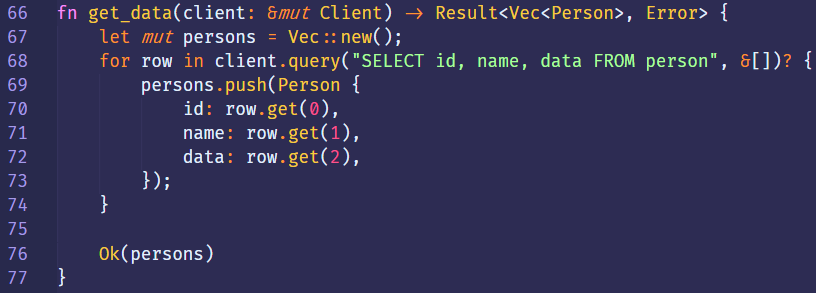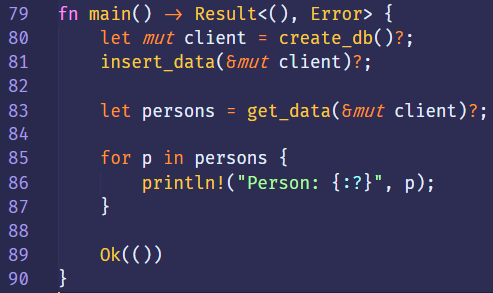Rust PostgreSQL 数据库
yangxu.pro 人气:0pgxr 是一个 Rust 的 crate 库,可以实现用 Rust 语言来编写 PostgreSQL 的扩展函数(相当于存储过程)。
这次,我们使用 postgres 这个 crate 来连接和操作 PostgreSQL 数据库。
创建好项目后,在 cargo.toml 里添加 postgres 的依赖:

首先,导入相关的类型,并创建一个 Person struct:

再创建 create_db 函数,用来创建数据库和表,它返回一个 Result,里面可能是 Client 或错误:
注意,Client::connect() 函数所接受的连接字符串可以是两种形式的:

Key-Value 形式。例如:Client::connect("host=localhost user=postgres", NoTls)?; 具体的 key 需要查阅官方文档。URL 形式。本例中使用的是 URL 形式。
一个相对完整的数据库连接字符串 URL 格式是:
postgres://username[:password]@host[:port][/database],其中 password、port、database 都是可选的。所以上面代码中做了相应的判断处理。
Client::connect() 函数的第二个参数用的是 NoTls,为了简单起见,这里我们不使用 TLS。
第 30、32 行,使用 Client 的 execute 方法先删除数据表(如果存在的话),然后再创建 person 表。
最后返回 Client。
接下来,创建 insert_data 函数,来插入一些数据:

注意该函数的参数 Client 必须是 mut 的。
再创建一个查询数据的函数:

这里,我们直接对 Client 的 query 方法返回的结果进行遍历,最后方法返回一个 Vec。
最后,在 main 函数里依次调用这些函数,并把查询结果打印出来:

结果如下:

全部代码如下:
use postgres::{error::Error, Client, NoTls};
#[derive(Debug)]
struct Person {
id: i32,
name: String,
data: Option<Vec<u8>>,
}
fn create_db() -> Result<Client, Error> {
let username = "postgres";
let password = "postgres";
let host = "localhost";
let port = "5432";
let database = "rust2021";
let conn_str = &format!(
"postgres://{}{}{}@{}{}{}{}{}",
username,
if password.is_empty() { "" } else { ":" },
password,
host,
if port.is_empty() { "" } else { ":" },
port,
if database.is_empty() { "" } else { "/" },
database
);
let mut client = Client::connect(conn_str, NoTls)?;
let _ = client.execute("DROP TABLE person", &[]);
client.execute(
"CREATE TABLE person (
id SERIAL PRIMARY KEY,
name TEXT NOT NULL,
data BYTEA
)",
&[],
)?;
Ok(client)
fn insert_data(client: &mut Client) -> Result<(), Error> {
let p1 = Person {
id: 1,
name: "Dave".to_string(),
data: None,
};
let p2 = Person {
id: 2,
name: "Nick".to_string(),
"INSERT INTO person (id, name, data)
VALUES ($1, $2, $3),
($4, $5, $6)",
&[&p1.id, &p1.name, &p1.data, &p2.id, &p2.name, &p2.data],
Ok(())
fn get_data(client: &mut Client) -> Result<Vec<Person>, Error> {
let mut persons = Vec::new();
for row in client.query("SELECT id, name, data FROM person", &[])? {
persons.push(Person {
id: row.get(0),
name: row.get(1),
data: row.get(2),
});
}
Ok(persons)
fn main() -> Result<(), Error> {
let mut client = create_db()?;
insert_data(&mut client)?;
let persons = get_data(&mut client)?;
for p in persons {
println!("Person: {:?}", p);加载全部内容